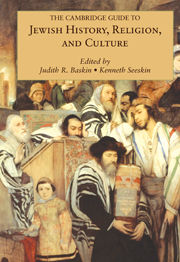Book contents
- Frontmatter
- Contents
- List of Figures and Tables
- List of Maps
- Contributors
- Acknowledgments
- The Cambridge Guide to Jewish History, Religion, and Culture
- Introduction
- 1 The Hebrew Bible and the Early History of Israel
- 2 The Second Temple Period
- 3 The Rabbinic Movement
- 4 The Jewish Experience in the Muslim World
- 5 Jewish Life in Western Christendom
- 6 Jews and Judaism in Early Modern Europe
- 7 European Jewry: 1800–1933
- 8 Jews and Judaism in the United States
- 9 The Shoah and Its Legacies
- 10 The Founding of Modern Israel and the Arab–Israeli Conflict
- 11 Judaism as a Religious System
- 12 The Centrality of Talmud
- 13 Jewish Worship and Liturgy
- 14 Jewish Private Life: Gender, Marriage, and the Lives of Women
- 15 Jewish Philosophy
- 16 Jewish Mysticism
- 17 Modern Jewish Thought
- 18 Contemporary Forms of Judaism
- 19 Jewish Popular Culture
- 20 Aspects of Israeli Society
- 21 The Future of World Jewish Communities
- Glossary
- Timeline
- Index
- References
15 - Jewish Philosophy
Published online by Cambridge University Press: 05 May 2015
- Frontmatter
- Contents
- List of Figures and Tables
- List of Maps
- Contributors
- Acknowledgments
- The Cambridge Guide to Jewish History, Religion, and Culture
- Introduction
- 1 The Hebrew Bible and the Early History of Israel
- 2 The Second Temple Period
- 3 The Rabbinic Movement
- 4 The Jewish Experience in the Muslim World
- 5 Jewish Life in Western Christendom
- 6 Jews and Judaism in Early Modern Europe
- 7 European Jewry: 1800–1933
- 8 Jews and Judaism in the United States
- 9 The Shoah and Its Legacies
- 10 The Founding of Modern Israel and the Arab–Israeli Conflict
- 11 Judaism as a Religious System
- 12 The Centrality of Talmud
- 13 Jewish Worship and Liturgy
- 14 Jewish Private Life: Gender, Marriage, and the Lives of Women
- 15 Jewish Philosophy
- 16 Jewish Mysticism
- 17 Modern Jewish Thought
- 18 Contemporary Forms of Judaism
- 19 Jewish Popular Culture
- 20 Aspects of Israeli Society
- 21 The Future of World Jewish Communities
- Glossary
- Timeline
- Index
- References
Summary
Judaism and philosophy each have had long and distinguished histories. Each offers a comprehensive outlook on the world, and each has evolved over time. In some periods, they evolved separately; in others, they were indistinguishable. In this chapter, I discuss the ways Judaism and philosophy have influenced each other. My chief claim will be that neither would have taken the path it did without the stimulus provided by the other.
BEGINNINGS
Philosophy as we know it began in Greece in the sixth century BCE. Originally it was indistinguishable from physics, astronomy, and other sciences in that all shared a common assumption: The phenomena we experience in everyday life can be explained by finding the causes or principles that underlie them. Whether we identify these principles as atoms, elements, forces, forms, or substances, the job of the philosopher is to explain the world in a systematic way. Ancient philosophy reached its high point in the fifth and fourth centuries BCE with the life of Socrates and worldviews of Plato and Aristotle. All three challenged the gods and goddesses of Greek mythology by arguing that anthropomorphism could not stand up to rational scrutiny. If all of reality can be explained by basic causes or principles, then God must be subject to them, the source of them, or be one principle among them. To take the most noteworthy example, Aristotle (384–322 BCE) defines God as the first mover of the universe, the ultimate source of motion and activity.
- Type
- Chapter
- Information
- The Cambridge Guide to Jewish History, Religion, and Culture , pp. 381 - 398Publisher: Cambridge University PressPrint publication year: 2010



